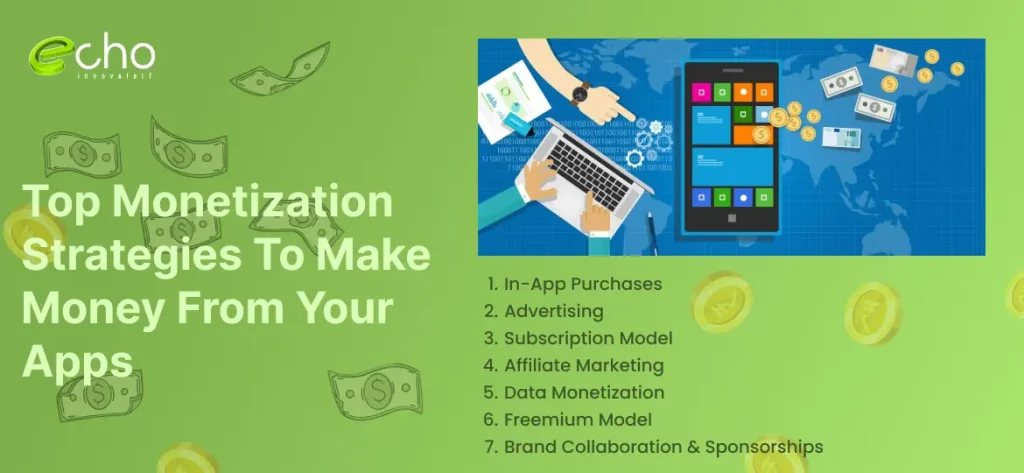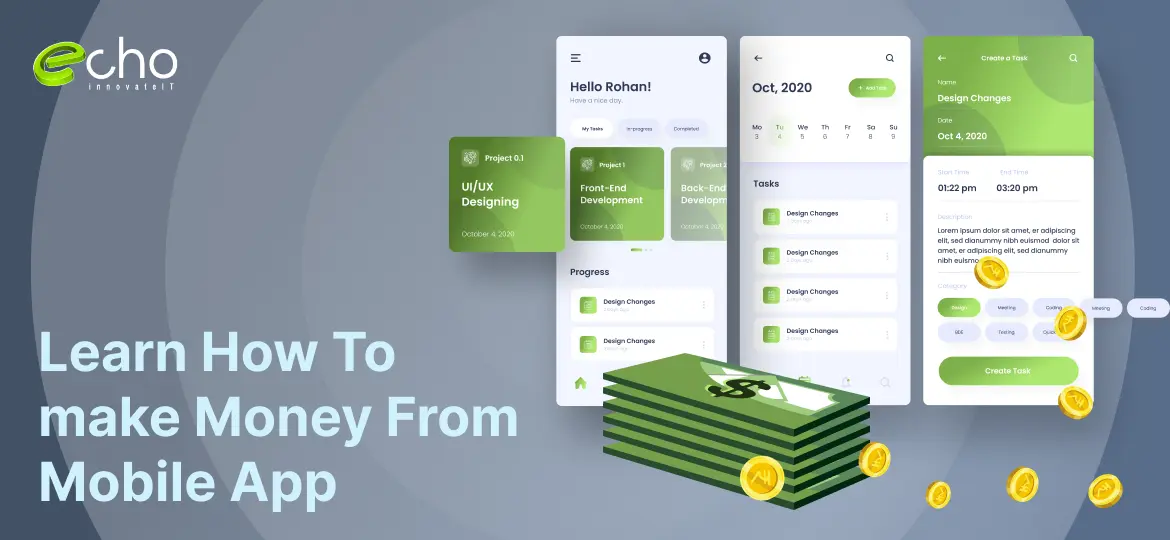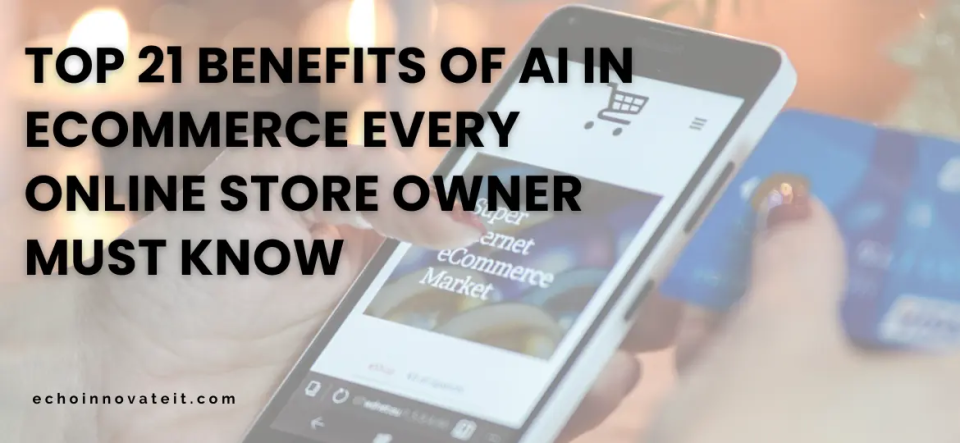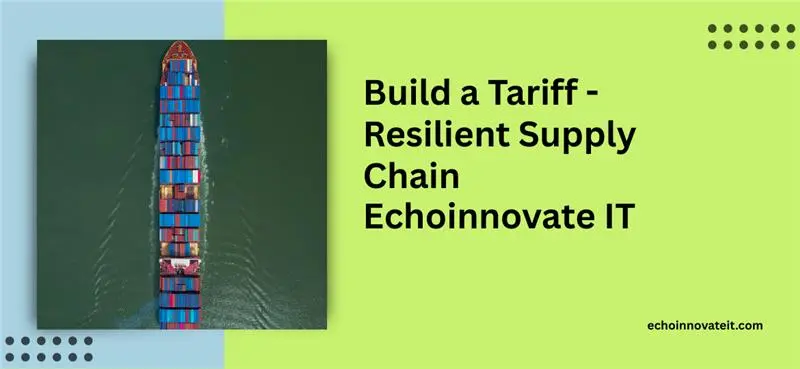The future of mobile app development is promising as it not only improves one’s presence in the market but also serves as a way to generate revenues. But you must be thinking, how? The mobile app industry is not just expanding but also bringing new opportunities to businesses. For example, the use of AI, AR, VR, blockchain, and IoT technology provides innovative solutions to users for which customers are even willing to pay. Most of the startup companies wish to earn high-end profits from their mobile apps.
But the question is how mobile apps can make money. And what steps do they need to take? More than that, what makes people worried is whether their apps even make money or not.
Such questions about monetization are asked when a company develops a profitable mobile application for their business. Firstly, what are the best apps to make money? It can be any app, even yours, because the best money making apps are those that opt for the right app monetization strategy right from the beginning. Monetization has become one of the most critical procedures in popular mobile applications. Entrepreneurs and mobile app developers are constantly looking for new and inventive methods to monetize their goods.
Therefore, it has become essential to create a well-structured mobile app strategy to make money when beginning your mobile application development journey. If you are planning to develop a mobile app or already own one, Echoinnovate IT can guide you on the best possible way to earn money and help you create a monetization plan wisely. Now, let’s go through this article to learn everything about the monetization approach.
Top Monetization Strategies To Make Money From Your Apps

Before you begin developing an app, you must first devise a plan and set goals. It could take some time to get correct. When creating your app or hiring a mobile app development business, you must decide on the optimal monetization method for your needs. The following are some common strategies you can choose from:
In-App Purchases
This monetization provides charging for additional features and monetization of virtual products within your app. It is a popular option for games and utility apps. Users can purchase power-ups, skins, and premium subscriptions.
Overall, this is an intriguing concept for turning non-paying app users into paying customers without being overly intrusive. However, you must keep people engaged with your free mobile apps so that they continue to purchase.
Pros
- Potential to generate high revenues
- Direct user value
- Customer engagement
Cons
- Technical complexity
- User acquisition cost
Advertising
Monetization of advertisements within your app is a frequent revenue strategy. This can be monetization using banner ad monetization, interstitial ads, or rewarded video commercials. Ad networks such as AdMob and Unity Ads help developers manage and optimize ad placements.
The specific payment mechanism depends on the ad type and your agreement with the third party network; you may only receive a predetermined charge for ads based on the number of views they generate. Other times, you may receive a more significant payment if a user opens the ad or takes an action based on it.
Pros
- Diverse ad formats
- Passive income
- Higher scalability
Cons
- Lower revenue
- Ad blockers
Subscription Model
The subscription model is one of the most effective and efficient ways for apps to generate revenue without using advertisements. Consumers are more than willing to pay a monthly membership fee for services and apps they enjoy. In exchange for a relatively cheap monthly fee, members can always cancel.
App developers and businesses get monthly recurring money via subscriptions. Customers will stay loyal to you as long as you deliver value, lowering your total cost of acquisition. This also allows you to present your content without any advertising. This is the ultimate win-win scenario for everyone!
Pros
- Predictable revenue
- Higher user value
- Premium features and content
Cons
- Higher acquisition cost
- Churn rate
- Price sensitivity
Affiliate Marketing
Numerous items and services in your sector may be eager to pay for relevant traffic that leads to sales. You can use the app to optimize traffic and make hefty commissions by participating in their affiliate marketing programs.
If you have a travel-related app, you may include affiliate links to websites where you can book hotels, flights, travel insurance, and so on. There is no need for expensive technical integrations to accomplish this. All you have to do is integrate the affiliate links into your content or app to start driving traffic. Depending on the affiliate program you use, you may receive compensation for each sale, click, or lead.
Pros
- Flexible income
- Variety of revenue streams
- User benefits
Cons
- Lower revenue per user
- Affect the user’s trust
- Compliance needs
Data Monetization
Because data powers practically everything, a rising number of businesses are devoting significant resources to obtaining reliable consumer data. Popular apps can collect behavioural data from mobile devices, making them essential tools for third-party trend researchers.
If your software captures user data in a responsible and ethical manner, you can monetize it by evaluating user behaviour and preferences. This information can be helpful in advertising, market research firms, and other businesses. However, it is critical to emphasize user privacy and adhere to data protection standards.
As appealing as this may appear, act with caution. Users who do not sign a user agreement granting you ownership of the data may have their data protected by federal and international law while using your app.
Pros
- Potential high revenue
- Product improvement
- Targeted advertising
Cons
- Privacy concerns
- Data quality
- User trust
Freemium Model
When considering traditional monetization strategy, it is essential to include the freemium model. Freemium apps are free to download. Nonetheless, a paywall prohibits access to some of the more desirable premium services. As a result, clients can access such premium services for an additional price. That’s why it’s called free + premium.
Freemium applications are more popular than premium apps because monetization prefers not to spend money right away. Users download apps that are less paid and do not offer a trial period.
Pros
- Large user base
- Upselling opportunities
- User Acquisition
Cons
- Less revenue from users
- User retention
Brand Collaboration & Sponsorships
Collaboration is the core of any sponsorship (or influencer) monetization plan. It is possible to work with monetizes or persons familiar to your target demographic. In addition to direct promotion, the sponsorship model offers other alternatives. Working with Instagram influencers is highly prevalent. Furthermore, not much money is required.
Finding relevant influencers that are well-liked by your target market is essential. After that, you present users with a barter system that differs according to the type of software. As a result, an advertiser may earn discounts, free entries, or other benefits.
Bloggers or celebrities who are also business partners will then promote your app. They give their subscribers for downloading your app and doing other activities. Hence, this is one of the highly effective strategies by which apps can make money without ads.
Pros
- High-value partnerships
- Improved brand awareness
- Direct source of revenue
Cons
- Limited opportunities
- Negotiation skills
Conclusion
Ending today’s blog, we are confident that these tactics will help you grow your business. But are you still thinking about whether the monetization approach is appropriate for you? Conduct in-depth market research to identify your target audience. Introduce a premium subscription if you are confident that customers will pay for your products right away. Suppose you’re providing a social service, apply crowdfunding, to obtain sponsorships and collaborations.
The same goes for e-commerce applications that sell their stuff. Provide free trials or commissions in your apps while acting as an intermediary. There are numerous monetization strategies available to create a money-making application, but determining the optimal ones to make money from free software requires thought.
Contact us today to employ expert app developers who can help you implement and change your monetization strategy based on user feedback and usage statistics.
FAQs- How To Earn Money From Mobile App
How can I earn money using a mobile app?
You can earn money through mobile apps by completing tasks, taking surveys, watching ads, selling products or services, or participating in affiliate marketing programs.
Are there any apps that pay you to complete tasks?
Yes, several apps like Swagbucks, InboxDollars, and TaskRabbit pay you for completing simple tasks such as surveys, watching videos, or performing small errands.
Can I make money by developing my own mobile app?
Yes, if you develop your own mobile app, you can earn money through ads, in-app purchases, or subscriptions.
How much money can I make from mobile apps?
Earnings vary depending on the app and the time invested. You can make anywhere from a few cents to hundreds of dollars per month, especially with consistent effort and smart strategies.



